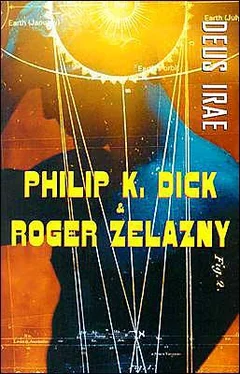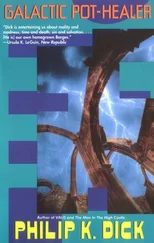“What do you want?” Pete asked.
“Hold this jug for me, please. I don’t want to spill any.”
“All right,” Pete said.
Holding his breath, he entered the stall and knelt beside the old man. He raised the frail shoulders with his right arm, gripped the jug with his left hand. “Here,” he said, and he held it tilted while the other drew a long series of swallows from it.
“Thank you,” said the man, coughing less vigorously than before, but still showering Pete’s wrist and forearm.
Pete lowered him quickly and set down the jug. He began to draw away, but a bony hand snatched his wrist.
“Don’t go, don’t go. I’m Tom, Tom Gleason. Where you from?”
“Utah. Charlottesville, Utah,” Pete said, struggling not to breathe.
“Denver,” said Tom, “that’s all, thank you. It was a nice city. Good people, you know? Someone always had the price of a flop and—what’s the word? Thunderbird!” He chuckled. “What’s the price? Thirty twice. You want a drink, mister? You have some of this. Ain’t bad. Found it in the cellar of an old place off the road, back—” His hand flopped. “What way? Oh hell! There’s more there. Have some. Still plenty here.”
“Thanks,” Pete said. “No.”
“You ever been to Denver?”
“No.”
“Remember how nice it was before they burned it. The people were nice, you know? They—”
Pete exhaled, breathed, gagged.
“Yeah, gets me that way, too,” Tom said. “Burning a nice place like that. Why’d they do it, anyhow?”
“It was a war,” Pete said. “Cities get bombed when you have wars.”
“I didn’t want no war. It was such a nice place. No reason to bomb a nice place like Denver. I got burned when they did it.” His hand plucked feebly at his tattered shirt. “Want to see my scars?”
“That’s all right.”
“I got ‘em. Got plenty. Had me in a field hospital for a while. Threw me out soon as I got better. It wasn’t nice anymore. Hardly anything to drink, or eat either. Those was rough times. I don’t remember so much anymore, but I went a lot of places after that. Nothing left like Denver was, though. Nothing nice left. People ain’t so nice anymore either, you know? Hard to get a little juice from folks nowadays. Sure you don’t want none?”
“Better save it,” Pete said. “Hard to get.”
“That’s the truth. Help me to another, will you?”
“Okay.”
While he was doing this, Tibor called out, “How is he?”
Pete said, “Coming around.” Then, “Wait awhile.”
On an impulse then, he asked Tom, “Do you know who Carleton Lufteufel was?”
The old man looked at him blankly, shook his head.
“Might have heard the name. Might not. Don’t remember so well anymore. Friend… ?”
“Just a name to me, too,” Pete said. “But I’ve got a friend here—a poor little inc, who has been looking all over for him. Probably, he’ll never find him. Probably, he’ll just go on and on and die looking.”
Tom’s eyes brimmed over.
“Poor little inc,” he said, “poor little inc…”
“Can you say the name?” Pete asked.
“What name?”
“Carleton Lufteufel.”
“Gimme another drink, please.”
Pete held him again.
“Now?” he said. “Now can you say Carleton Lufteufel?”
“Carleton Lufteufel,” Tom said. “I can still talk. Just my memory that’s bad…”
“Would you—” No, it was ridiculous. Tibor would see right through it. Or would he? Pete wondered. Tom Gleason was about the right age. Tibor already thought he was ill, knew he had been drinking. And more important, perhaps, Tibor’s faith in his own judgment seemed to have waned since the killing of Schuld/Lufteufel. If I act convinced, Pete thought, will it be enough of an extra push to make him believe? If I act convinced and Tom states it for a fact? We could go on forever, wandering, looking, without another opportunity like this, a chance to return to Charlottesville, to finish my studies, to see Lurine again. And if I could succeed, think of the irony! Think of the Servants of Wrath bowing down, praying to, venerating, adoring, not their god in the form of Carleton Lufteufel, but one of his victims: a worthless derelict, a drunken brain-scarred old drifter, a panhandler, a wino, a man—a man who had never done anything to or for his fellows, a maimed human cipher who had never wielded power of any sort; just a man, at his lowest. Think of him in the SOWs’ place of honor! I have to try.
“Would you do a kindness for my poor little inc friend?” he asked.
“Do a what? A kindness? God, yes… There’s enough misery in the world. If it’s not too hard, that is. I’m not the man I used to be. What’s he want?”
“He wants to see Carleton Lufteufel, a man we will never find. All that he wants to do is take his picture. Would you—would you say that you are Carleton Lufteufel, that you were once Chairman of the ERDA? And if he asks you, that you gave the bomb order? That’s all. Would you do it? Can you?”
“One more drink,” Tom said.
Pete raised him to the jug.
“Is everything all right?” Tibor called out.
“Yes,” Pete called back. “This may be very important! We may have had a stroke of luck, if I can get this fellow back into shape… Hold on!”
He lowered the jug. Tom eased away from his arm and sat unassisted. And then, by degrees, his eyes shut. He had passed out. Either that, or—god forbid; he was dead.
“Tom,” Pete said.
Silence. And the inertness of a million years: something below the level of life, something still inanimate which had never made it up to sentience. And probably never would.
Shit, Pete Sands thought. He took the bottle of wine, put the screw-type lid back on it, sat for a time. “The piece of luck I was talking about,” he called loudly. “Do you believe at all in destiny?”
“What?” Tibor yelled back, with signs of irritation.
Reaching into his pocket, Pete Sands got out his roll of silver dimes, always kept there. The all-purpose winning possession, he thought; he got a good grip on the roll of dimes and then tapped it against Tom’s cheekbone. Nothing. No response. Pete then tore the heavy brown-paper wrapper away from the dunes. The metal corns slithered and tinkled against one another, manifesting themselves into visibility.
“Carleton Lufteufel,” ol’ Tom muttered, eyes still shut. “That poor little inc. I wouldn’t want the poor blighted inc wandering till he got hurt. It’s a rough world out there, you know?” Ol’ Tom opened his eyes; they were clear and lucid as he surveyed the many dimes in Pete’s palm. “Chairman of the ERDA, whatever that is—and I gave the bomb order, if the inc asks me. Okay; I got it straight. Carleton Lufteufel, that’s me.” He coughed and spat again, ran his fingers through his hair. “You wouldn’t have a comb, would you? If I’m going to have my picture took—” He held out his hand. Pete gave him the dimes. All of them.
“Afraid not,” Pete said.
“You help me up then. Carleton Lufteufel, ERDA, bomb order if he asks.” Ol’ Tom put the dimes away, out of sight; all at once they were gone. As if they had never been.
Pete said loudly, “This is extraordinary. You think there’s a supernatural entity which guides men along every step of their lives? You think that, Tibor? I never thought so, not before. But my god. I have been talking with this man since he woke up. He is not well, but then he has been through a lot.” He prodded Tom Gleason. “Tell my friend who you are,” he said.
Tom showed a broken-toothed smile. “Name’s Carleton Lufteufel.”
Tibor gasped. “Are you joking?”
“Wouldn’t joke about my own name now, son. A man might use a lot of them in a lot of different places. But at a time like this, when someone’s been looking so hard for me, there’s no point in denying it. Yes, I’m Carleton Lufteufel. I used to be Chairman of the ERDA.”
Читать дальше








